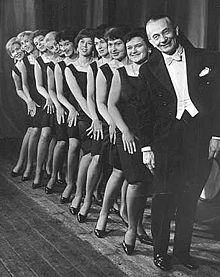Mieczysław Fogg
Mieczysław Fogg , actually Mieczysław Fogiel , (born May 30, 1901 in Warsaw ; † September 3, 1990 ibid) was a Polish chanson singer .
Life
Fogg's father was a train driver and his mother ran a shop in Warsaw. From 1919 to 1921 Fogg was a volunteer in the Polish Army and took part in the Soviet-Polish War . where he was involved in the struggles to liberate the city of Vilnius . His father had planned for him a career in engineering, which Fogg actually began in 1922 when he joined the Warsaw State Railways. He also sang in the church choir, where his singing talent was discovered in December 1922 by the actor and director Ludwik Sempoliński . Through Sempoliński's mediation, Fogg received professional musical training at the Fryderyk Chopin Music School in Warsaw.
His artistic career began in 1927 in the five-piece choir ensemble Dana , with whom he performed at the Warsaw theater Qui pro quo . In July 1929 Fogg made his first record with the ensemble, followed by his first solo record in March 1930. The group, which performed folk song arrangements in addition to jazz arrangements, achieved worldwide popularity: in 1931 they performed in the Berlin Varieté Scala , and they also made guest tours to Estonia, Latvia, Norway, Austria, Italy, France, Czechoslovakia, the USSR and the USSR the USA.
In the 1930s Fogg appeared increasingly as a soloist in cabarets and revues as well as on the radio, where he quickly became a star with catchy melodies and sentimental texts about love and home. During this time he recorded up to 150 songs annually on record. His recording of "To ostatnia niedziela" sold over 100,000 copies and was an unprecedented sales record in pre-war Poland. In 1938 he left the Dana Ensemble to concentrate fully on his solo career. In October of that year he embarked on a solo tour in the United States of America that lasted 14 weeks, some of which were broadcast nationwide by NBC on radio. In the USA he played records on the renowned RCA Victor label . In 1939 he was the first Pole to appear on television when he gave a studio performance in London .
At the beginning of World War II , Fogg appeared in front of the Polish army that was fighting against Hitler's Germany, as well as (while it was still in operation) on Polish radio. During the occupation he initially tried to sing in revues and cafes, but stopped these attempts after he realized that he was being watched by the Gestapo . He then worked as a waiter and joined the Home Army . In the Warsaw Uprising of 1944, he not only fought against the Germans with gun in hand, but also gave a large number of concerts in the positions, hospitals and on the barricades of the embattled capital. He was wounded several times in the fighting.
Fogg saved the lives of several Jewish friends who were friends during the occupation by offering them shelter in his apartment and obtaining forged travel documents. The Yad Vashem Memorial therefore included him in its list of Righteous Among the Nations in 1989 .
His fame as one of the best-known Polish artists was also not affected by the communists, who initially even allowed him to run his own café and record label. Fogg performed his songs in many countries, including America, Germany, Sweden, France and Australia. In 1980 he played himself in the popular TV series Dom (The House). A year later he starred in the film Miłość ci wszystko wybaczy (Love will forgive you everything), which traced the life of actress Hanka Ordonówna .
His memoirs appeared in 1971 under the title Od palanta do belcanta .
The most famous songs by Mieczysław Fogg
- To ostatnia niedziela - This is the last Sunday
- Warszawska piosenka - Warsaw song
- W małym kinie - In a small cinema
Web links
- Mieczyslaw Fogg to the website of Yad Vashem (English)
Individual evidence
- ↑ a b c d e f [1] Janusz R. Kowalczyk: Mieczysław Fogg, May 30, 1901 - September 3, 1990 (Polish), Culture.pl, August 2013, accessed on June 9, 2019.
- ^ The Righteous Among The Nations Fogg Mieczysław (1901-1990) (English), accessed June 23, 2019.
| personal data | |
|---|---|
| SURNAME | Fogg, Mieczyslaw |
| ALTERNATIVE NAMES | Fogiel, Mieczysław |
| BRIEF DESCRIPTION | Polish singer |
| DATE OF BIRTH | May 30, 1901 |
| PLACE OF BIRTH | Warsaw , Poland |
| DATE OF DEATH | 3rd September 1990 |
| Place of death | Warsaw , Poland |
